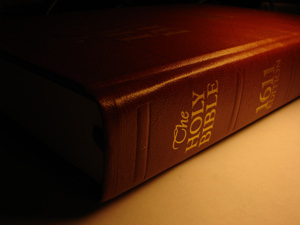
DAVID ADAMS examines a Bible translation with a long legacy…
|
|
This year marks the 400th anniversary of the creation of the King James Bible, it’s only fitting to take a look at how it came about.
While there had been English-language Bibles for a couple of hundred years prior to the King James Bible, much of the Bible had only first been translated from the original Hebrew and Greek into English in England in the 1530s by William Tyndale (Tyndale’s translation of the New Testament was also the first printed Bible in English).
In 1603, Queen Elizabeth I died and King James VI of Scotland ascended to the throne of England as King James I.
Amid an ongoing push for reform within the church from Puritans (these included concerns over the translation of the so-called Bishop’s Bible, introduced by the Church of England in 1568, and the Great Bible, the name given to Miles Coverdale’s 1539 version of Tyndale’s work), one of the first things the new king did was called together bishops, clergymen and professors for a conference.
In January 1604, the men assembled at Hampton Court Palace outside London – known as the Hampton Court Conference – and spent three days in discussion. A new translation of the Bible was not apparently on the original agenda (and, it’s been suggested, that King James not only stacked the deck against the Puritans but failed to listen to any of their demands), but when John Reynolds, a Puritan and president of Oxford’s Corpus Christi College, suggested a new translation because recent translations were not true to the original text, it was meet with a positive response. King James I then commissioned a new translation “to be used in all churches of England in time of divine service”.
Fifty four learned men were nominated to undertake the task, although in the end only 47, all of whom were clergy bar the scholar Sir Henry Savile, were actually involved. Operating under the direction of Richard Bancroft, Archbishop of Canterbury, others included included Lancelot Andrewes, Bishop of Chichester from 1605, Dr Edward Lively, Regius Professor of Hebrew at Cambridge University, and Dr John Overall, Professor of Divinity at Cambridge and later Dean of St Paul’s in London and a bishop.
Organised into six different groups, they met in Westminster, Cambridge and Oxford and were allocated different parts of the Bible to work on in accordance with 15 general rules including that the Bishop’s Bible be the primary guide for the translators and the no marginal notes be included (this had apparently been one of the concerns with one of the previous Bibles, the Geneva Bible).
The groups spent four years working on the translation before the completed text was taken to the Stationers’ Hall in London where it underwent a nine-month review by a “General Committee of Review”. Printed by the King’s Printer, Robert Barker, the new Bible was first issued in late 1611.
Having later becoming known as the “Authorised Version”, it was subsequently revised several times – including in 1629, 1638, 1762 and, most recently, in 1769 – and, after a somewhat shakey start – eventually became the authoritative text. It’s influence continued to grow and remains great today…but that’s another story.
FOR MORE:
King James Bible Trust
Thomas Nelson Publishers
If you have a word you’d like to know the origins of, simply send an email to [email protected].





